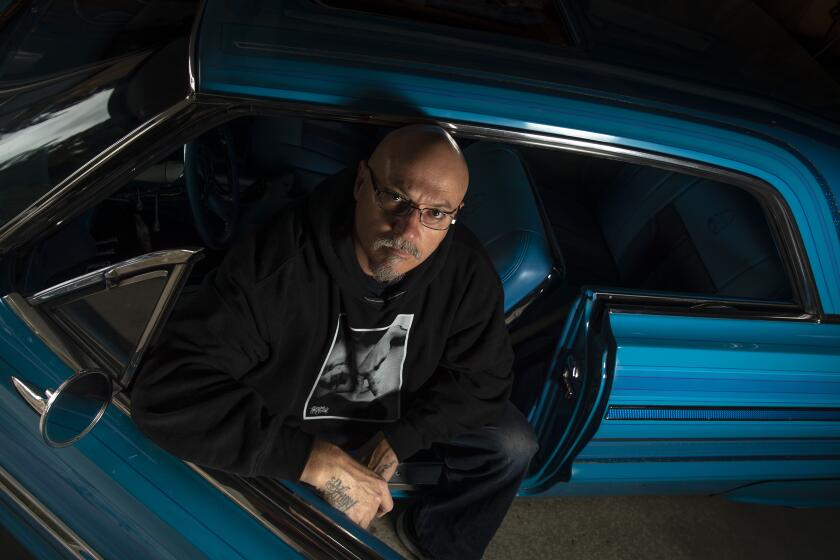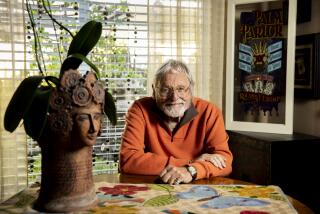Mister Cartoon, tattooist to the stars, draws on ‘memories and fantasies’ for first solo show
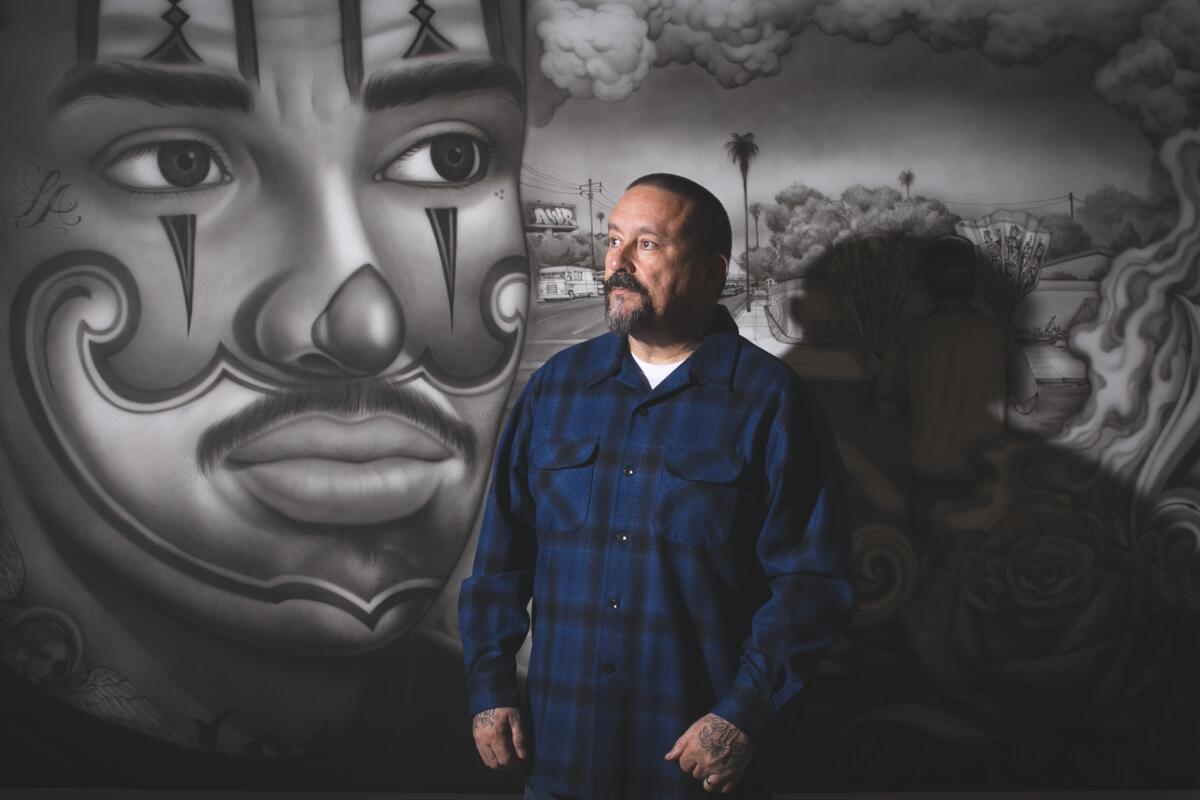
- Share via
He’s the tattoo artist to the stars, having inked the flesh of Eminem, Snoop Dogg, Christina Aguilera, 50 Cent and so many others. He’s exhibited work in museums and galleries — not to mention murals on public walls — in Paris, London, Tokyo, Bangkok and elsewhere internationally. He’s known for dynamic automotive air brush design. And his limited-edition Nike Air Force 1 sneakers? They sell for upwards of $2,000.
But Mister Cartoon has not yet had a solo exhibition in his hometown of L.A. — or anywhere else — until now.
The artist, a San Pedro native, who’s been integral to the rising popularity of the Chicano art movement over the last 30 years, will debut “Just My Imagination” at Hollywood’s Beyond the Streets and Control Gallery this Saturday. The show includes 20 new paintings and graffiti’d works on paper, as well as an updated, hand-painted mini-sculpture of his signature cat character, Bronson, and one of his vintage custom art cars, “The Gangster Squad.” Beyond the Streets Publishing is also releasing a new book of 290 drawings, over two decades, that traces the evolution of Mister Cartoon’s designs.
Mister Cartoon, tagger turned tattooist to the stars, and Estevan Oriol, bouncer turned hip-hop documentarian, have a new Netflix film, ‘LA Originals.’
On a recent tour of the exhibition as it was being installed, Mister Cartoon — a.k.a. Mark Machado, or “Cartoon,” as he’s often referred to — appeared humbled by the imminent opening, which he says has been “a long time coming.”
“It’s living up to where people think you’re at, because I’ve been in so many exhibitions,” he says. “I want to show people, through my art, what kind of music I’m interested in, my passion for and obsession with cars and automotive, taking people’s tattoos and peeling them off and putting them on the canvas, taking a mural off of a [Chevrolet] Impala and putting it on a canvas. It’s a huge moment, I don’t take it for granted.”
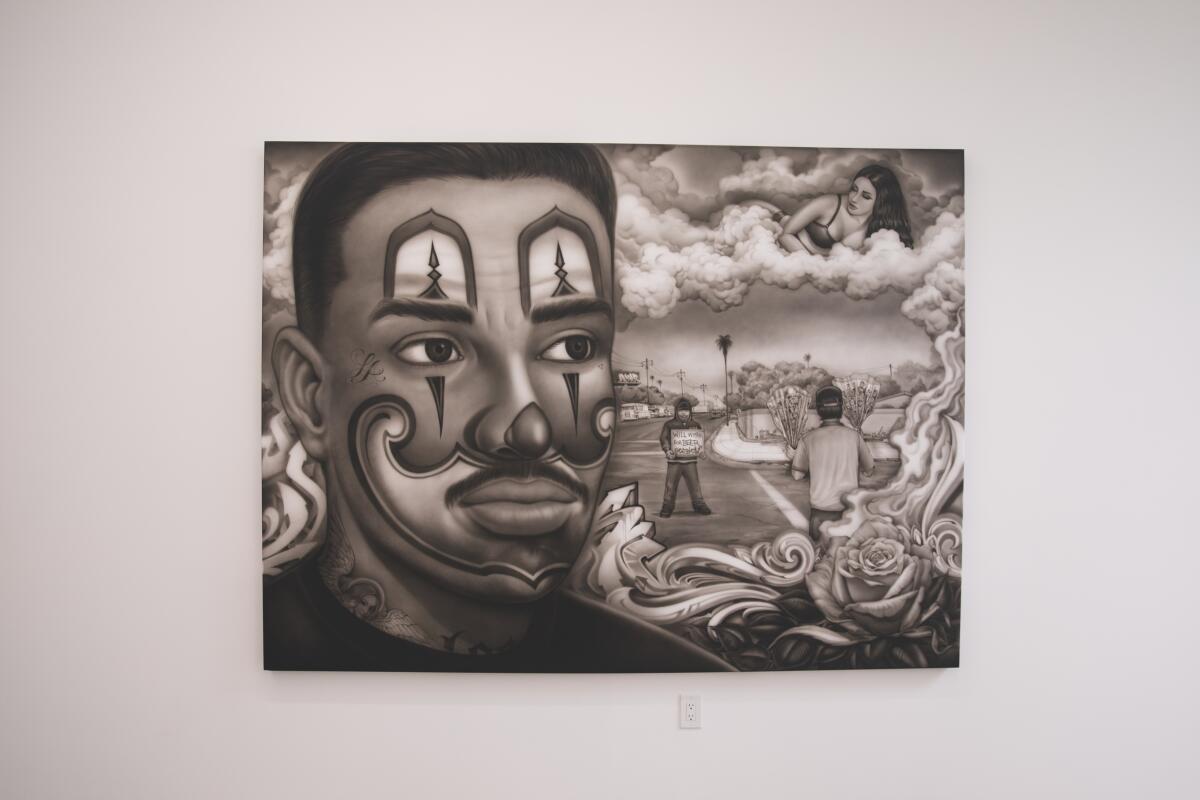
Roger Gastman, who co-curated the Museum of Contemporary Art’s 2011 “Art in the Streets” exhibition, had included Cartoon in three iterations of his traveling exhibition spotlighting graffiti and street artists, “Beyond the Streets.” The two had been talking about Cartoon doing a solo show for years.
The challenge was time. Cartoon’s popularity in the tattoo community and his commercial success as a graphic designer and in the fashion industry had, in a sense, hampered his ability to move forward as a fine artist — he didn’t have time to take a step back and create the large body of work needed for a solo show.
“He’s been busy,” Gastman says. “He’s one of the most sought-after tattoo artists, sought after as a painter and designer of cars, for commercial work and everything else. Being able to sit down for six months and make paintings is not something that’s been easy for him to do. He’s never made this many paintings [at once] before. For this show, it was: Let’s go for it. Let’s do the big show. Tell the stories that have been in your head forever.”
The exhibition was hatched when, in 2022, Beyond the Streets opened a flagship bricks-and-mortar space on La Brea Avenue along with the adjacent Control Gallery to showcase contemporary art. Gastman sometimes uses the two outlets for related programming, and Cartoon’s exhibition will fill both galleries — “a total takeover,” Gastman says.
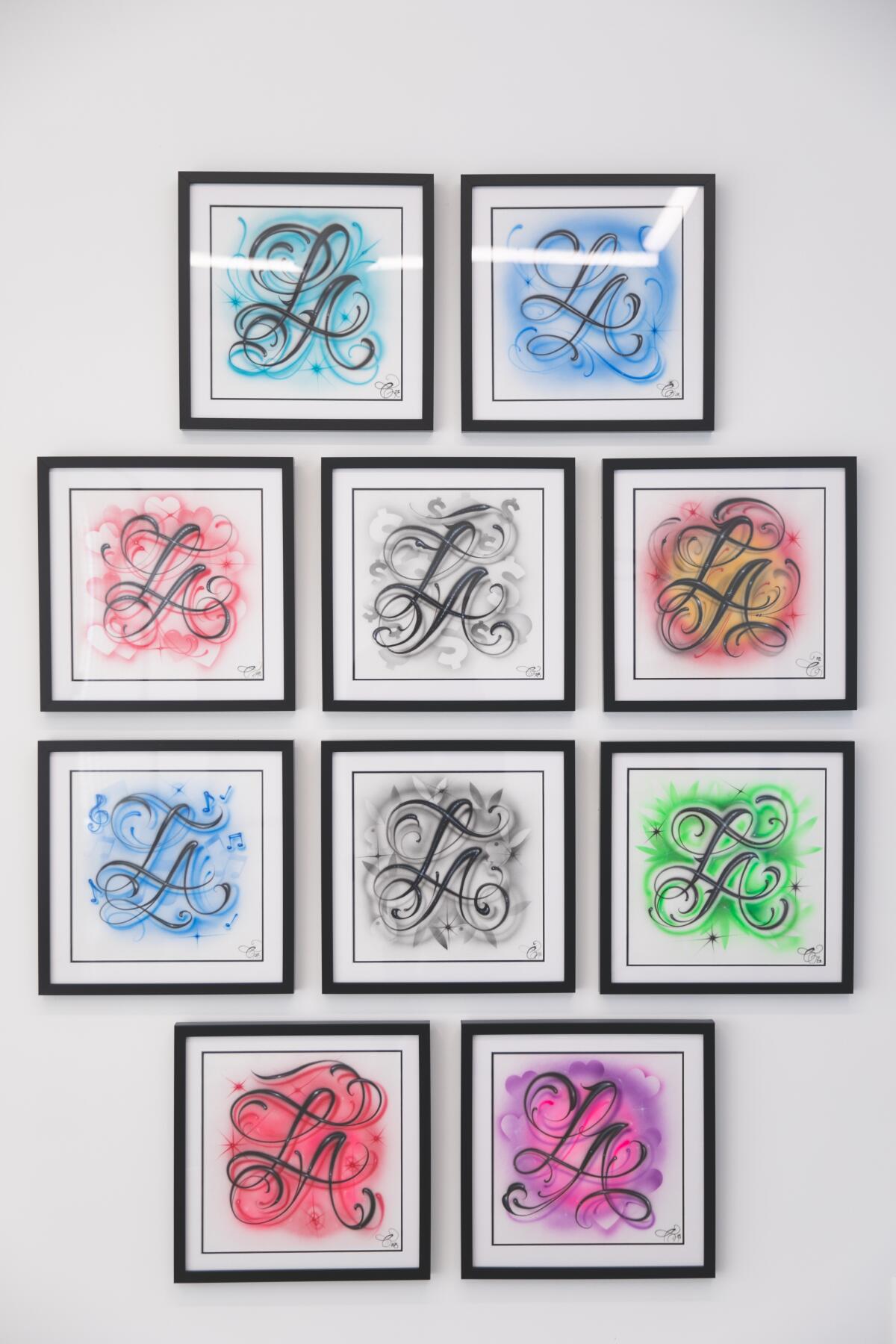
Cartoon, 54, spent half a year creating art for the show, working in his home studio in the San Fernando Valley that he shares with two of his four children. Though consisting of new work, the show has the feel of a survey exhibition given its scope. It touches on Cartoon’s roots as a graffiti artist, his foray into sign painting, his passion for lowrider custom-car culture and the years, in the early ‘90s, on the road with his creative partner, photographer and director Estevan Oriol, immersed in the hip-hop scene. Not to mention his pivot to tattoo art at the time, a game-changer for his career that elevated his presence as an artist.
Stepping away from the grind of commercial work and clients, he says, “I was able to paint for me and my peers and my family. The freedom has been very special, a time for self-refection: What do I want to say on my platform? Who am I as an artist? How can I take 30 years and put it into a couple of rooms, show my evolution?”
The answer, Cartoon says, was an exhibition he describes as “a collage of my memories and fantasies.”
The show is especially personal. At its heart, it’s about relationships — between Cartoon and his family, friends and tattoo clients throughout the years, but also his relationship to music and cars and art as well as, more generally, humans’ relationships to work and death. Characters appear repeatedly in the paintings, amalgams of figures in Cartoon’s life. His tattoo designs show up on their body parts and appear around the gallery. Vintage cars he’s owned populate the canvases.
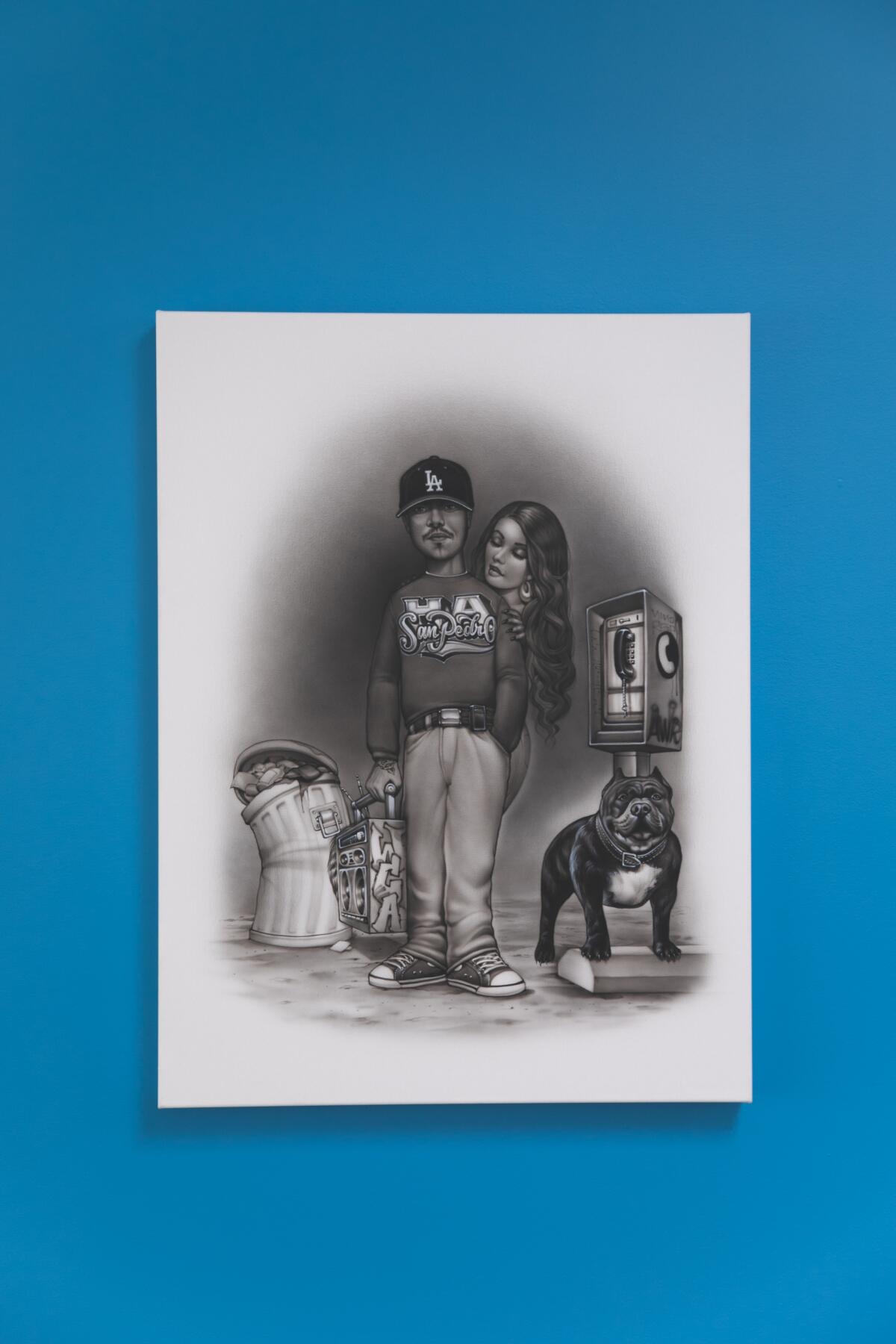
Cars saved Cartoon’s life, he says. Growing up in a working-class family, in the ‘70s and ‘80s, he recalls his parents worked “all the time” at the print shop they owned. “I hung out with the homies on the street,” he says. “We started writing on walls and terrorizing a bit. I saw friends get incarcerated or pass away due to street life, and that definitely pushed me into the car world. It was a way to still be cool with the fellas, but not gangster activities.”
All the work in the show is made with automotive paint and using the technique of airbrush painting. Cartoon tattoos in the black and gray fine-line style developed in prisons in the West and on the streets of East L.A. in the ‘70s. As such, most of his paintings on canvas are rendered in black, white and gray tones. But three paintings in the show — inspired by cars — stand in sharp contrast. Glossy, bursting with color and framed with shimmering, delicate line work, they’re painted on sloping pieces of hand-hammered aluminum that mimic the look of car hoods. The works are especially labor intensive, repeatedly sanded, primed and painted, then sealed. The curved metal and high gloss surface create reflections that lend the works an almost three-dimensional quality.
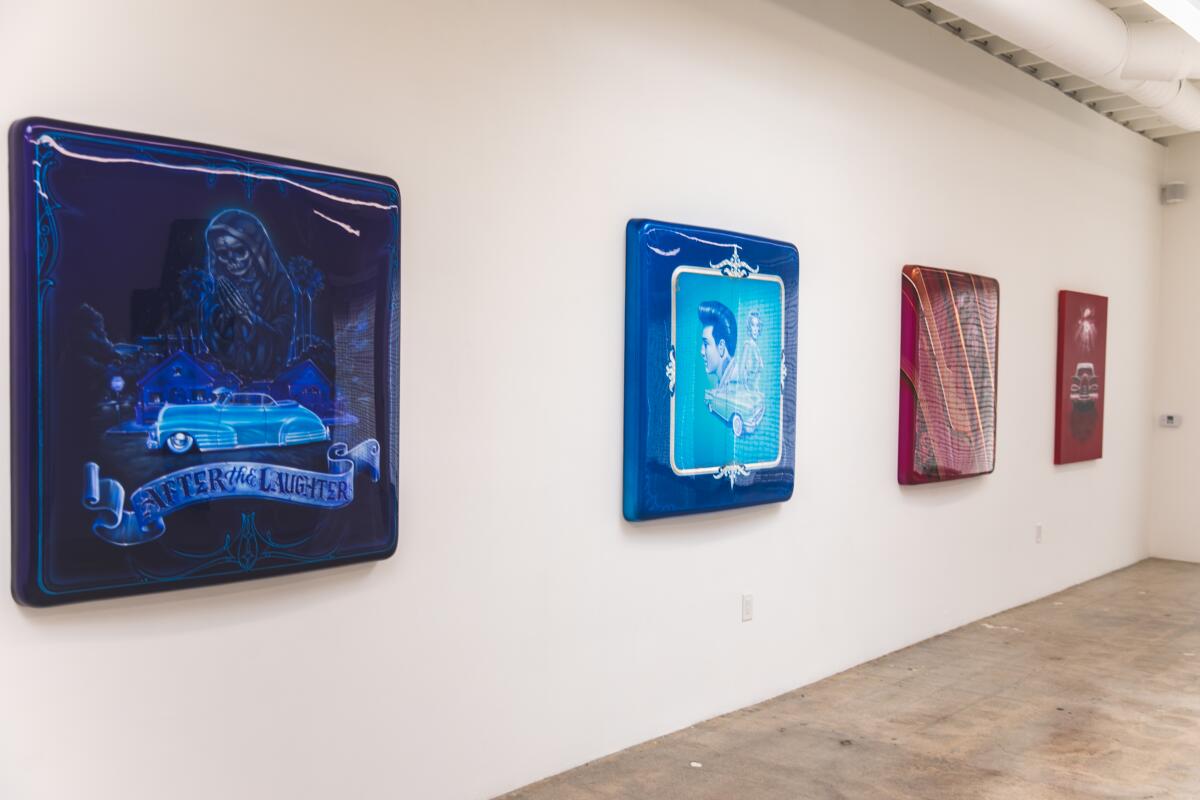
Clouds, a recurring theme in Cartoon’s work over the decades, factor in heavily. His cityscapes appear under skies blanketed with stormy or pillowy clouds. Other canvases, filled to the edges with clouds alone, contain hidden faces — “Easter eggs” — in the nooks and shadows.
“When I started traveling, I’d look out the window of an airplane, just looking up at the sky, and they just always seemed so innocent,” Cartoon says of clouds. “They look like paintings to me. I’ve been drawing them since I was a kid. They’re free form and always flowing, moving. It’s that dream state.”
Cartoon’s fantasies in some of the paintings are as vibrant as his memories of real-life experiences — often more so, he says. One painting on aluminum depicts “Mexican Marilyn Monroe — Mariposa — and El Vez,” he says. Bathed in aqua and cobalt, the characters rise out of a ‘57 Chevy Bel Air convertible. The image captures Cartoon’s affection for the “glamorous, noirish” 1940s and 1950s.
“My father grew up then,” he says. “I think I spent a lot of my life fantasizing about living in that era and buying all the cars at the dealership. Go back in my time machine to 1959: ‘Hey, how much for that used ‘57 convertible? $1,200, you say? OK, wrap it up. I’ll take three.’ This is the American dream. In this case, the Mexican American dream.”
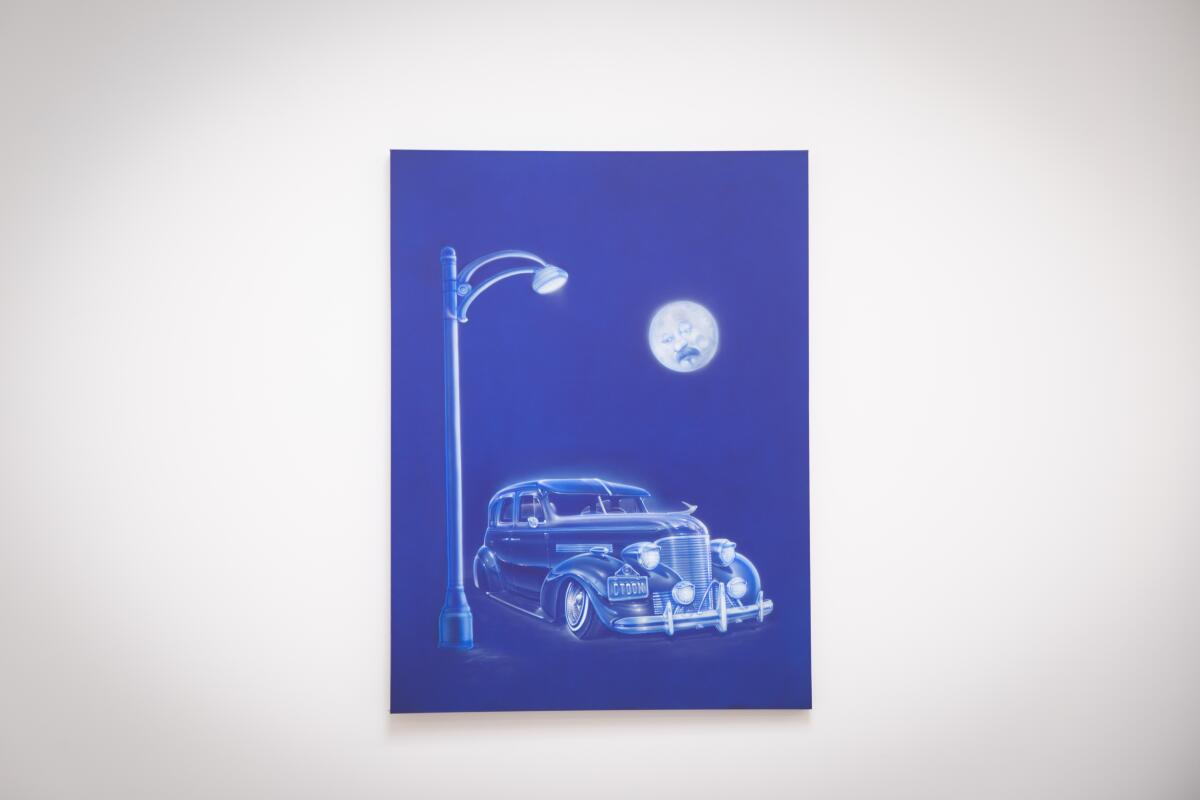
Cartoon listens to classic soul music from the ‘60s and ‘70s when he paints — hence, the title of the exhibition, from a Temptations song — and music from those eras will play in the background in the galleries.
There will also be a large-scale tattoo station installation on view, filled with Cartoon’s hand-painted signs, an ode to his history in the medium and still-active tattoo shop in Santa Monica.
“This is where my canvas is breathing and walking around,” he says. “It could end up in a plane or in a casket, or get married or go to Austria. The tattoos travel.”
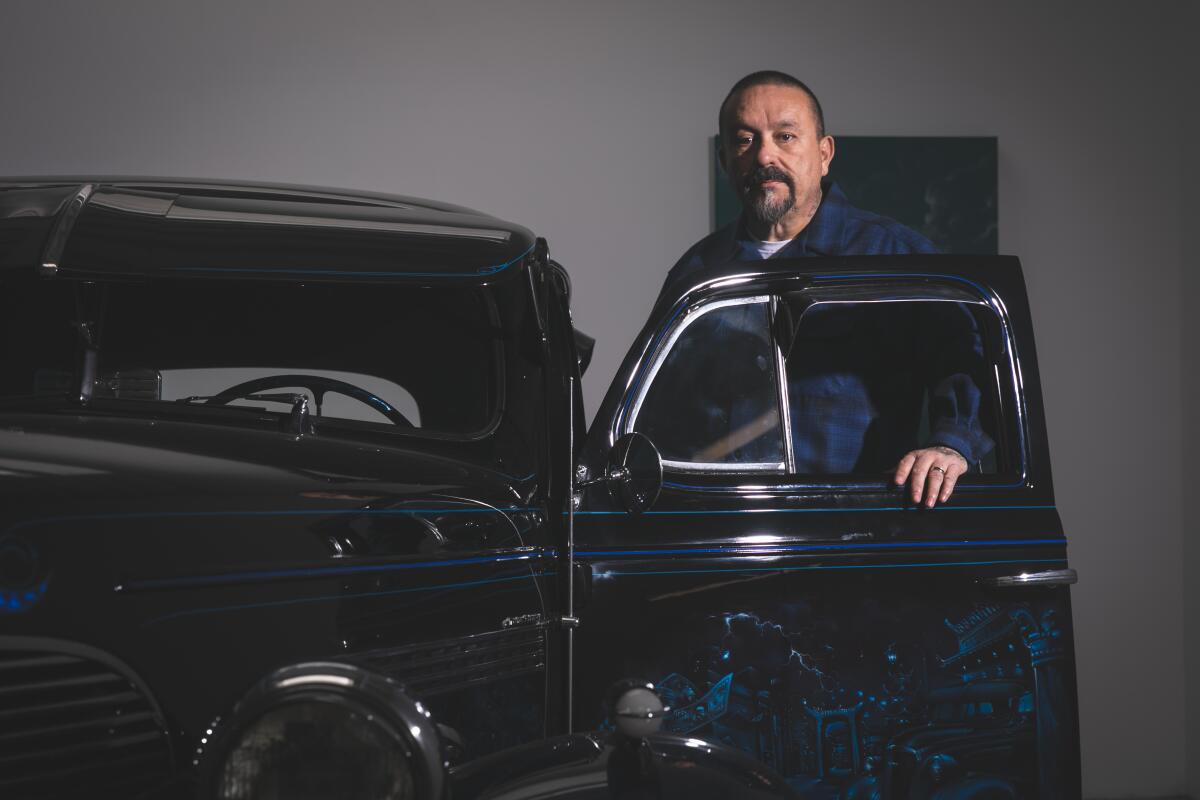
Cartoon leans against his 1939 Chevy Master Deluxe parked inside the gallery. It’s glossy midnight blue. It has a broad, proud nose “with the attitude of Al Capone,” he says, and it features a mural of gangsters on both sides and the trunk.
“I’m a storyteller,” Cartoon says. “This show, it’s the story of good times and bad times, the yin and yang of life, positives and negatives, the struggle and the joy and the build of it all.”
In the ‘80s and ‘90s, he adds, he witnessed the collision of emerging hip hop, tattoo culture, street art and street fashion as well as evolving lowrider car culture and the growing Chicano art movement — all of which are storylines in the show.
“I was told back then to find your part. ‘How are you gonna contribute to this cultural movement?’ ” he says. “I tried breaking, I tried DJ’ing and I decided I can draw better than I can dance. So I better stick with that.”
“Mister Cartoon’s “Just My Imagination”
Where: Beyond the Streets and Control Gallery, 434 N La Brea Ave. L.A.
When: June 10 - July 16, Wed.-Sun. 11 a.m. - 6 p.m. Free
Info: beyondthestreets.com
More to Read
The biggest entertainment stories
Get our big stories about Hollywood, film, television, music, arts, culture and more right in your inbox as soon as they publish.
You may occasionally receive promotional content from the Los Angeles Times.
